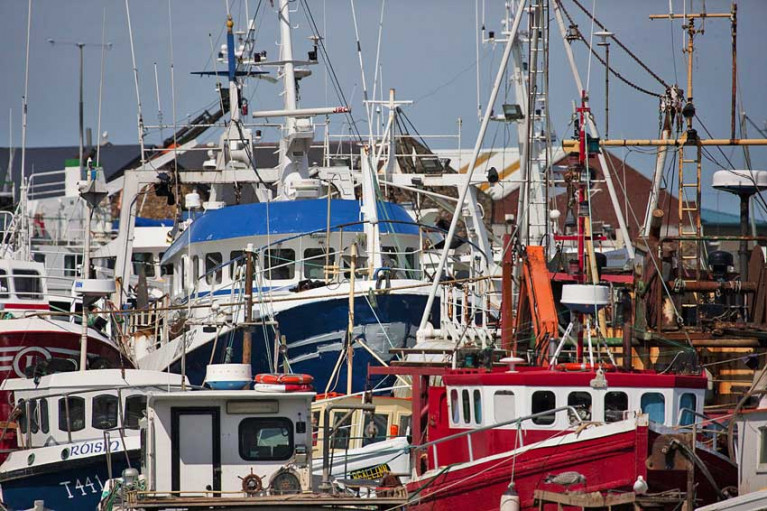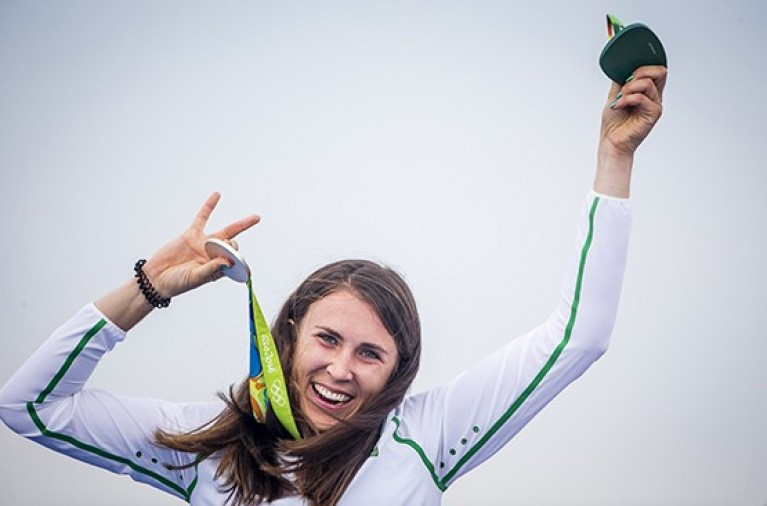Displaying items by tag: Programme for Government
A ‘Green New Deal’, protections for Ireland’s fishing sector and a successor to Harnessing Our Ocean Wealth with a greater focus on sustainability are among the promises included in the draft Programme for Government published this afternoon (Monday 15 June), which as previously reported also features an emphasis on high performance sport.
Under the ‘Marine’ heading, the document states:
We are committed to prioritising the development of the marine. As an island nation, Ireland has a special relationship with the ocean. Everything must be done to protect marine biodiversity and to secure a sustainable future for the fisheries sector while supporting coastal communities.
We will:
- Develop a new integrated marine sustainable development plan, as a successor to Harnessing Our Ocean Wealth, focusing on all aspects of the marine, with a greater focus on sustainability and stakeholder engagement and centrally co-ordinated by the Department of the Taoiseach to be implemented over the life of the Government.
- Ensure protection of the interests of the Irish Fishing industry by insisting that a Fisheries Agreement with the UK is concluded as an integral part of an overall EU Free Trade Agreement with the UK.
- Recognise that the critical issue in these negotiations for the Irish industry is continued access to UK waters and quota share and the danger of displacement of the EU fleet into Irish territorial waters.
- Seek EU Commission contingency supports and market disturbance funding for the fisheries sector to mitigate against the impact of Covid-19 and Brexit.
- Ensure that inshore waters continue to be protected for smaller fishing vessels and recreational fishers and that pair trawling will be prohibited inside the six-mile limit.
- Support the inshore fishing fleet in generating greater marketing and promotional capacity by facilitating the establishment of a Producer Organisation for these smaller fishing vessels, thereby providing additional opportunity for the island and coastal communities involved in the inshore sector.
- Aggressively tackle the issue of waste, ghost nets and illegal dumping in the marine environment through rigorous
implementation of the Port Reception Facilities Directives and by requiring all Irish fishing trawlers to participate in the Clean Oceans Initiative, ensuring that plastic fished up at sea is brought ashore. - Continue to invest in coastline communities through the Fisheries Local Area Group (FLAG) programme, providing support for innovative projects to boost economic growth and job creation.
- Invest strategically in harbour infrastructure to attract increased landings into Ireland of sustainably caught fish in our waters, driving the development of the seafood processing sector and the blue economy in coastal communities.
- Work to develop the aquaculture sector in a sustainable way, including shellfish aquaculture using native species, and implement the recommendations of the report of the Independent Aquaculture Licensing Review Group, to ensure that feed products for aquaculture are sourced and produced in the most sustainable manner possible.
- Progress a national policy on coastal erosion and flooding having regard to climate change.
As regards the Common Fisheries Policy, the draft programme says:
We are fully committed to the environmental objectives of the CFP, which has introduced measures aimed at sustaining fish stocks, through the ending of discards, quotas based on science and the internationally recognised concept of Maximum Sustainable Yield (MSY).
We will:
- Actively promote setting annual quotas in line with MSY principles.
- Promote the introduction of constructive technical measures that promote sustainability, decrease by-catch and protect fish stocks for the future.
- Protect Ireland’s interests in the future review of the Common Fisheries Policy.
- Work to eliminate illegal fishing and promote a culture of compliance by all EU vessels in our 200-mile zone, in order to protect the fish stocks on which the Irish Fishing industry depends.
- Implement the Sea Fisheries Protection Authority (SFPA) capability review with a view to enhancing governance issues and consider any other measures that may be necessary.
- Implement a fair EU points system in order to protect fish stocks and ensure the release of suspended EU funding.
- Work to retain factory weighing of pelagic fish in the context of negotiations on the new EU control regulation.
- Support the completion of the new Fisheries Control Regulation to increase the effectiveness of existing control measures and agree rules that will ensure a level playing field for all EU vessels.
Increasing the level of transparency and access to information in regards to infringements within Irish waters will be key to measuring the effectiveness of the new system.
Marine Protected Areas get their own heading, with a declaration of support for “the principles and ambition of the EU Biodiversity Strategy” and a vow to “develop comprehensive legislation for the identification, designation and management of Marine Protected Areas (MPAs) in Irish territorial waters”:
We will realise our outstanding target of 10% under the Marine Strategy Framework Directive as soon as is practical and aim for 30% of marine protected areas by 2030. This will be done on the basis of scientific expertise and in close consultation with all stakeholders, in particular the fishing industry as well as environmental and community representatives. This consultation process will begin in the first 100 days of Government.
We will examine the establishment of an offshore maritime area as Ireland’s seventh national park. This would form part of the expanded MPAs and allow for a learning experience in the maritime environment.
Under ‘Marine Planning’, the document says Government “will prioritise the passage of a balanced and Aarhus Convention compliant Marine and Planning and Development Management Bill through the Oireachtas”:
We will publish Ireland’s first ever marine spatial planning policy setting out a clear vision for the future development of our marine planning system. The development of this policy will involve a full public and stakeholder consultation.
Following completion of this, we will bring forward Ireland’s first ever National Marine Planning Framework. This will introduce a planning system for the development of Ireland’s maritime area in the same way that the National Planning Framework fulfils this function on land.
These two documents will form the basis for Project Ireland Marine 2040, our long-term overarching strategy to manage Ireland’s seas for the benefit of all its people. A marine planning oversight delivery board on the same model as the Project Ireland 2040 Delivery Board will be established to provide leadership and oversight to the implementation of these policies.
Elsewhere, the potential of coastal ‘blue carbon’ in tackling climate change gets a focus, “but we appreciate that further scientific research is needed to understand and develop this potential”:
We will task the Marine Institute with a collaborative EU-wide research initiative, aimed at investigating the climate change mitigation potential of blue carbon and working towards a means of creating a validated inventory that will in the future assist the EU in meeting our climate change objectives.
In future Brexit-related negotiations, the draft programme promises that Government will defend the interests of Irish fisheries among other strong export sectors and the wider economy.
Priorities in the negotiations include “achieving the best possible deal for the Irish fishing industry in relation to access conditions, quota shares and the traditional activity of the EU fleet while insisting that fisheries issues are dealt with as part of an overall trade deal”.
There is also a pledge to “ensure that environmental marine conservation and pollution control measures are protected in bilateral relations”.
‘A Green New Deal’ figures prominently in the draft text, described as “a transformational programme of research and development to ensure Ireland is at the cutting edge of scientific and technological innovation in meeting our climate change targets”.
This includes “in the bioeconomy, in marine sequestration, in green hydrogen, in wave technology, [and] in developing floating offshore wind turbines to take advantage of the Atlantic coastline”.
There is a proposed “major drive to realise the immense potential of Ireland’s offshore renewables”, as well as a pledged to “evaluate and implement plans to realise the carbon sink potential of our marine environment based on the introduction of Marine Protection Areas”.
To deliver 70% renewable energy by 2030, the Government says it will “give cross-government priority to the drafting of the Marine Planning and Development Bill so that it is published as soon as possible and enacted within nine months”.
Under a new national waste plan, there is a promise to “continue and expand the Clean Oceans Initiative to collect, reduce and reuse marine litter and clean up our marine environment”.
And the draft pledges to recognise the importance of fisheries and tourism among other sectors “that support balanced regional development and employment”.
Under tourism initiatives, there is a promise to “work with the Northern Ireland Executive to deliver the flagship cross-border Ulster Canal Project in order to restore the all-island inland water system as a premier tourism attraction”.
And as well as promoting the annual SeaFest, Ireland’s biggest maritime festival, there is a pledge to “continue to sustainably develop the marine sector by building on existing partnerships to optimise our assets for the benefit of tourism and broader economic development”.
High performance sport receives an emphasis in the draft Programme for Government published this afternoon (Monday 15 June) after the leaders of Fine Gael, Fianna Fáil and the Green Party reached agreement following marathon weekend talks.
Under the heading ‘High Performance’, the document (attached below) states: “Sport can engender enormous national and local pride when our teams and athletes perform well. It is integral to our culture, identity and history. Our high performance athletes inspire the next generation, reinforcing high standards and motivating children in every community.”
To that and, the Government says it will:
- Publish a High Performance strategy to define Ireland’s direction for at least 12 years, and review it every four years. The strategy will set clear and ambitious medal targets over three Olympic/Paralympic cycles.
- Facilitate efforts to explore business and philanthropic funding of high performance sport to complement State funding.
- Step up State funding to compete with other highly-successful countries of our size, and to facilitate a multi-cycle approach to high performance funding.
- Develop initiatives to increase the level of media coverage, nationally and locally, of women’s sport and attendance at women’s sport event.
While continuing initiatives such as the Sports Capital Programme, the programme also includes a plan to develop a Sports Technology Innovation fund “to encourage research and development of interventions to support participation and excellence”.
Under rural development, the document includes a promise to “support, through a consultative process, community groups, arts and cultural bodies, sports clubs, voluntary organisations and charities to recover and enhance their impact in the aftermath of Covid-19”.
Sports clubs in general will also note that the draft programme promises to tackle insurance costs by, among other measures, “considering changes to the Occupiers Liability Act and the Civil Liability Act (duty of care) to strengthen waivers and notices to increase protections for consumers, businesses, sporting clubs and community groups”.































































